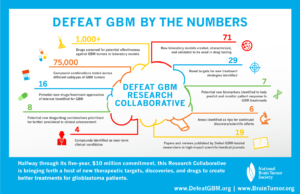Defeat GBM Impact
The Defeat GBM Research Collaborative formalized in 2013 and initiated its research programs in 2014. In this short time it has already proven that its unique research model can be successful in contributing state-of-the-art scientific discovery and to applying this learning for drug development and clinical evaluation. In the first 18 months, Defeat GBM research has generated a prolific number of publications contributing important new insight into the mechanisms and biomarkers of acquired drug resistance in GBM patients. This knowledge will form the basis of developing future Defeat GBM strategies to overcome as well as monitor the development of resistance to therapies. In addition the Defeat GBM team is strategically involved in an unprecedented global adaptive clinical trial for GBM patients. This accelerated transfer of findings from the Discovery core to the Clinical Trial research core is a testament to the enhanced collaboration and progress made possible by the leading-edge structure of the Collaborative.
Download the Defeat GBM Overview and 2017 Progress Report:
Defeat GBM: Project Overview
Glioblastoma is a disease of frequent genetic alterations and targeting the aberrations in such molecular pathways is a current focus of novel treatment development for GBM. However, studies have shown that GBMs can adapt to targeted treatments and acquire drug resistance. To develop more effective treatments and define appropriate drug combinations, the identification and validation of robust targets that drive malignancy needs to be accompanied by the identification of resistance mechanisms. The Defeat GBM initiative is made up of four interrelated research cores that encompass 1) Target Discovery 2) Drug Development 3) Biomarker Development and 4) Innovative Clinical Trials.
Led by top cancer researchers and clinicians, all simultaneously conducted projects span the key areas of drug discovery and development where better knowledge and progress are required to advance the field and improve the lives of patients. Each team will follow the same goals to achieve real progress on defined objectives over a multi-year, deadline-driven agenda to:
- Quicken the Pace of Discovery – More basic scientific research is vital to identify the right targets and associated resistance mechanisms of GBM.
- Transfer Target Knowledge to Drug Development – Once the targets are identified, focus on testing compounds and drugs against the targets to block the cancer-activating genes, pathways, and associated resistance mechanisms with the right drugs.
- Identify Patient Biomarker Panels to Improve Clinical Trial Success – Use new data about targets to create diagnostic tools that will help select the right patients for the right treatments and test the therapies to achieve clinical trial success.
- Conduct Innovative Clinical Trials – Take advantage of the study of genetic alterations, systems biology, and molecular profiling of GBM patients to develop trials that are faster, more focused, and less costly so that the right therapies can be delivered to the right patients quickly.
Download the 2017 Defeat GBM Overview and Progress Report
Defeat GBM Oversight
In partnership with the Strategic Scientific Advisory Council, the Initiative is chaired by Scientific Director, Dr. W. K. Alfred Yung, MD Anderson Cancer Center, and Cure GBM LLC, a subsidiary of National Brain Tumor Society, to oversee the Defeat GBM Research Collaborative and ensure attainment of key milestones and overall goals which are a prerequisite for continued project funding.


